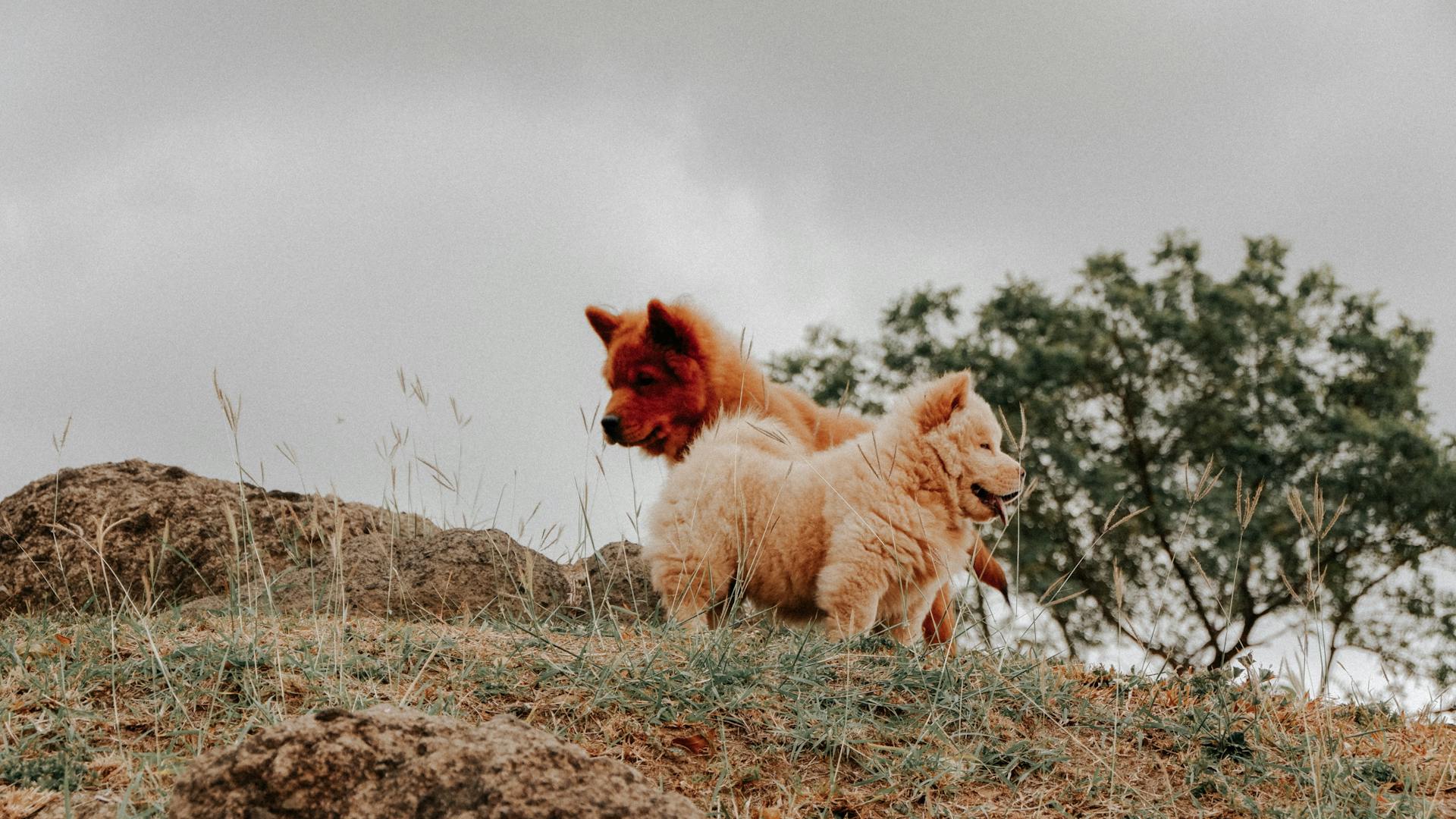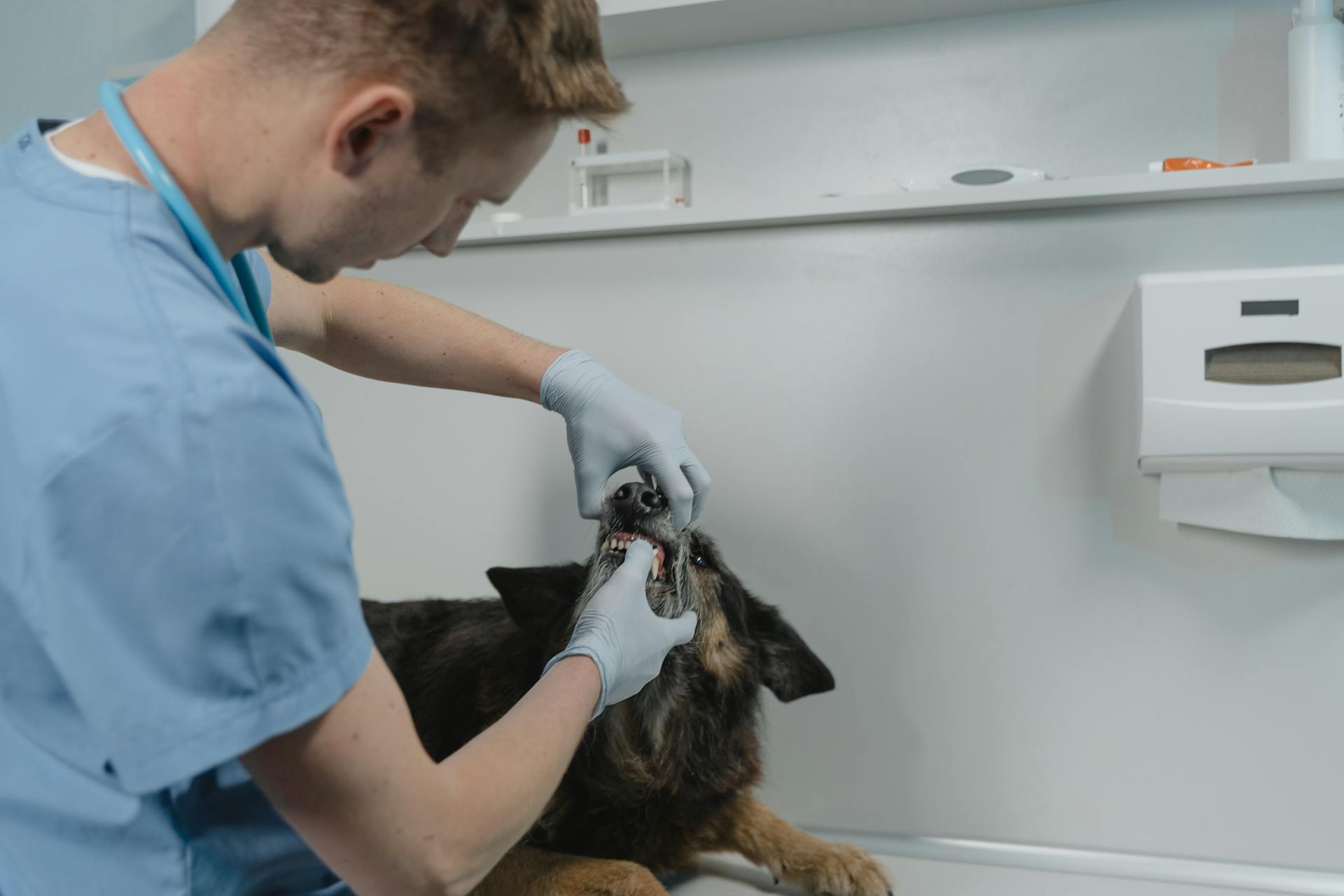
Kennel cough is a common canine respiratory infection that can be distressing for dogs and their owners. It's characterized by a distinctive cough, which is often described as a harsh, hacking sound.
Dogs with kennel cough may cough repeatedly, sometimes up to 20 times in a row. This can be alarming, especially if you're not familiar with the sound.
The cough is usually most pronounced after exercise or play, when the dog's airways are inflamed and irritated. This can be a good indicator that kennel cough is the culprit.
In some cases, the cough may be accompanied by a slight wheezing or honking sound, which can be a sign of a more severe infection.
Diagnosing Kennel Cough
Diagnosing kennel cough in dogs is typically based on their symptoms, history, and response to therapy. Identifying the underlying bacteria or virus is usually not necessary.
However, diagnostic testing is recommended in certain situations. For instance, if a dog shows signs of pneumonia, doesn't respond to supportive care, or has signs of systemic disease, testing is advised. Additionally, if an outbreak is occurring in multiple dogs, testing can help identify the cause.
Diagnostic testing is also crucial if your dog's symptoms worsen or don't improve with treatment. If your dog is showing severe symptoms such as lethargy, loss of appetite, fever, or labored breathing, seek veterinary attention immediately.
On a similar theme: Dogs with Allergies Symptoms
Symptoms in Dogs
A persistent dry, hacking cough is one of the primary symptoms of kennel cough in dogs.
Coughing during the night can be a significant issue, keeping both you and your dog awake.
Retching with the production of white foam is another symptom of kennel cough.
Clear eye drainage and a runny nose are also common symptoms.
Tracheal sensitivity, where your dog coughs when you apply gentle pressure to their trachea, is a key indicator.
In severe cases, symptoms can progress to lethargy, loss of appetite, fever, and labored breathing.
Here are some key symptoms to watch out for:
- Lethargy
- Loss of appetite
- Fever
- Labored breathing
If your dog is experiencing any of these severe symptoms, it's essential to seek immediate veterinary attention.
Veterinarian Diagnosis
A veterinarian can diagnose kennel cough in dogs based on the dog's symptoms, history, and response to therapy. In many cases, identifying the underlying bacteria or virus is not necessary.
Dogs that don't respond to supportive care may require additional diagnostic testing. This is especially true if pneumonia is suspected.
If an outbreak is occurring in multiple dogs, diagnostic testing is recommended. This helps identify the cause and prevent further spread.
Diagnostic testing is also recommended for dogs with signs of systemic disease. This ensures the underlying cause is addressed.
Diagnostic testing is typically only recommended for these specific situations, as it can be an added expense and stress for both dogs and owners.
Here's an interesting read: Can Allergies Cause Swollen Lymph Nodes in Dogs
Testing and Confirmation
The diagnosis of kennel cough is confirmed through a combination of clinical signs, physical examination, and laboratory tests.
A thorough physical examination is essential to rule out other underlying conditions that may be causing the cough.
The presence of a harsh, hacking cough, often accompanied by a runny nose and eye discharge, is a key indicator of kennel cough.
A veterinarian may use a stethoscope to listen to the dog's lungs and check for signs of pneumonia or other respiratory problems.
Laboratory tests, such as a complete blood count (CBC) and a biochemistry profile, can help rule out other conditions that may be causing the cough.
Take a look at this: Dogs Diabetes
A rapid diagnostic test (RDT) for kennel cough can be performed using a nasal swab or a throat swab to detect the presence of the Bordetella bronchiseptica bacteria.
The results of the RDT can confirm the diagnosis of kennel cough within 15-30 minutes.
A veterinarian may also use radiography (x-rays) or ultrasonography to visualize the lungs and rule out other underlying conditions.
The combination of clinical signs, physical examination, and laboratory tests can provide a definitive diagnosis of kennel cough.
Preventing Kennel Cough
To minimize the risk of your pet getting kennel cough, vaccination against Bordetella bronchiseptica is generally recommended.
Fully vaccinated dogs can still get kennel cough, so it's essential to take further precautions.
Causes and Transmission
Kennel cough is caused by a viral or bacterial infection, with Bordetella bronchiseptica being the primary bacterial culprit. This bacteria is highly contagious and can be spread through the air when an infected dog coughs or sneezes.
Dogs can also contract kennel cough by coming into contact with contaminated surfaces, such as food and water bowls, or even the hands of a handler who has touched an infected dog.
Prevention Methods
Getting your dog vaccinated against Bordetella bronchiseptica is a recommended step to help minimize the risk of kennel cough. This vaccine can help protect your pet from one of the common causes of kennel cough.
Regular veterinary check-ups are essential to ensure your dog's overall health and resilience. A professional can provide guidance on vaccinations, nutrition, and other health-related matters.
Ensuring a balanced diet is crucial for a dog's immune system. A robust immune system is a dog's best defense against kennel cough and other canine infections.
Asking about vaccine requirements when looking for grooming facilities, daycare facilities, or doggy play date partners is a good idea. This can help ensure the dogs your pup will be in contact with are also vaccinated.
Regular exercise and a low-stress environment contribute to a dog's overall health and resilience.
Take a look at this: Skin Care for Dogs with Allergies
Treating Kennel Cough
Kennel cough is usually self-limiting and will resolve on its own within 7-14 days. This is because the virus is not life-threatening, but it can be uncomfortable for your dog.
Symptoms can be managed with supportive care, including plenty of rest, fluids, and a nutritious diet. In some cases, your veterinarian may prescribe antibiotics to treat secondary bacterial infections.
Rest is key to helping your dog recover from kennel cough. This means reducing exercise and playtime to prevent further irritation of the throat.
Antibiotics can help clear up secondary infections, but they won't shorten the duration of the cough itself. Your veterinarian will be able to determine the best course of treatment for your dog.
Over-the-counter cough suppressants are not recommended for dogs, as they can be toxic. Always consult with your veterinarian before giving your dog any medication.
Check this out: What Antibiotic Treats Kennel Cough
Recovery and Care
Recovery from kennel cough is a relatively quick process, with most dogs back to their usual selves within one to two weeks.
Isolating your dog from others is crucial during this time to prevent the spread of infection.
Rest, fluids, and possibly anti-inflammatory medications or cough suppressants are usually recommended by veterinarians to soothe the cough.
Recovery and Care
Isolating your dog from others is crucial to prevent the spread of infection, so keep them separate from other pets and people.

Rest is essential for your dog's recovery, so provide a quiet and comfortable space for them to relax.
Fluids are also important to keep your dog hydrated, so make sure they have access to plenty of water.
Anti-inflammatory medications or cough suppressants might be prescribed by your veterinarian to soothe the cough.
Antibiotics are only used if there's a secondary bacterial infection, typically involving Bordetella.
Recovery time for kennel cough can vary, but most dogs are back to their usual selves within one to two weeks.
In cases where pneumonia or other complications occur, the road to recovery is longer and typically requires more intensive veterinary care.
Helping Your Dog Recover
Provide a quiet and comfortable space for your dog to rest and recover. This can be a crate or a quiet room in your home.
Keep your dog hydrated by offering plenty of fresh water. Aim for 1/2 to 1 ounce of water per pound of body weight per day.
Related reading: My Dogs Ear Sounds like It Has Water in It
Monitor your dog's temperature and seek veterinary attention if it exceeds 104°F (40°C) or drops below 100°F (38°C).
Avoid giving your dog food for the first 24 hours after surgery or illness, as this can cause stomach upset.
Limit your dog's activity to short, gentle walks and playtime, and avoid strenuous exercise for several weeks.
Give your dog plenty of love and attention, but also respect their boundaries and needs during recovery.
Support and Monitoring
Having a support system in place is crucial for a smooth recovery process. According to research, having a strong social support network can reduce the risk of relapse by up to 50%.
Regular check-ins with loved ones can help individuals stay accountable and motivated. This can be as simple as daily phone calls or text messages.
Monitoring progress is also essential for identifying potential issues early on. By tracking vital signs and symptoms, individuals can quickly alert their healthcare team to any changes.
A journal can be a helpful tool for monitoring progress and identifying patterns. Writing down thoughts, feelings, and experiences can provide valuable insights into one's recovery journey.

Receiving support from a mental health professional can make a significant difference in the recovery process. According to studies, working with a therapist can increase treatment adherence by up to 30%.
Having a support group can also provide a sense of community and connection. Sharing experiences and advice with others who have gone through similar struggles can be incredibly empowering.
Frequently Asked Questions
What can be confused for kennel cough?
Dogs with kennel cough may also exhibit symptoms of other conditions, including canine distemper virus, canine influenza virus, collapsing trachea, bronchitis, asthma, and heart disease
What does Bordetella cough sound like?
Bordetella cough sounds like a dry, hacking cough often followed by retching or gagging, similar to a cat hacking up a hairball. This distinctive sound is a key symptom of the infection.
Sources
- https://www.petmd.com/dog/conditions/respiratory/kennel-cough-dogs-symptoms-and-treatments
- https://www.guilfordjamestownvet.com/site/blog-greensboro-vet/2024/02/15/dog-kennel-cough-symptoms
- https://snoutsnstouts.com/dog-safety/how-do-dogs-get-kennel-cough/
- https://vetster.com/en/wellness/i-think-my-dog-has-kennel-cough-now-what
- https://www.foundanimals.org/kennel-cough-treat/
Featured Images: pexels.com


